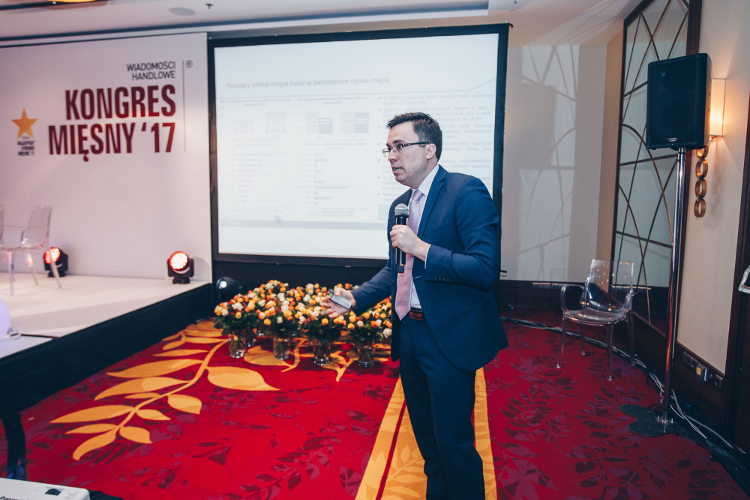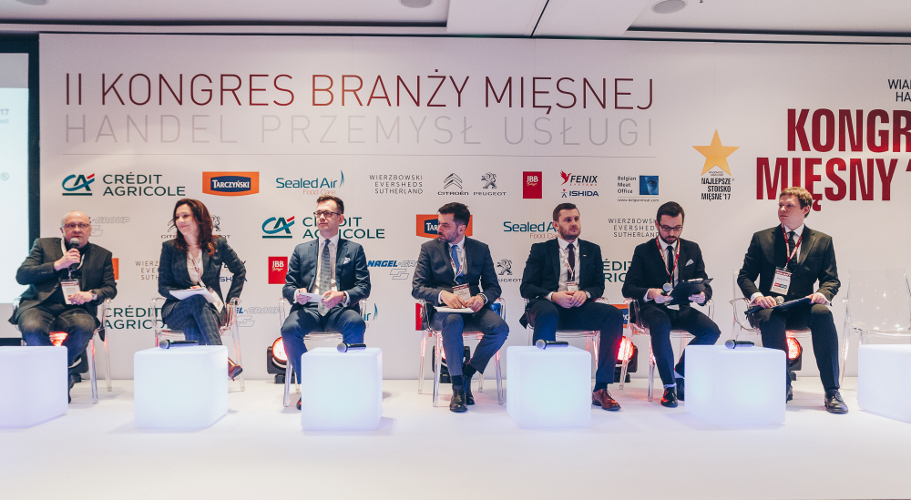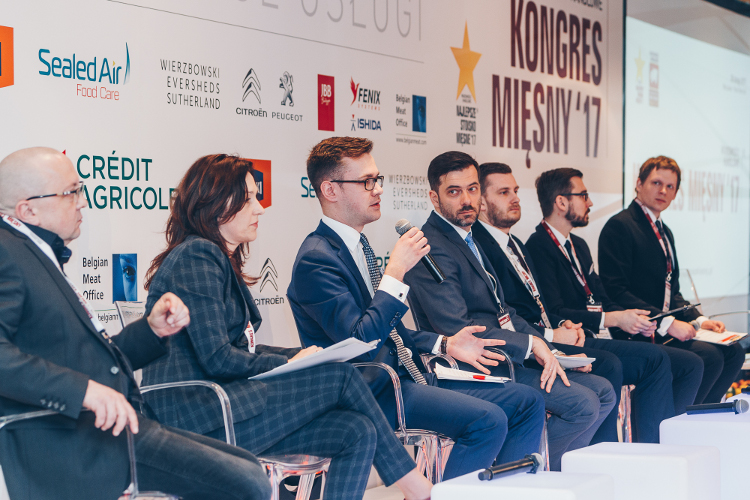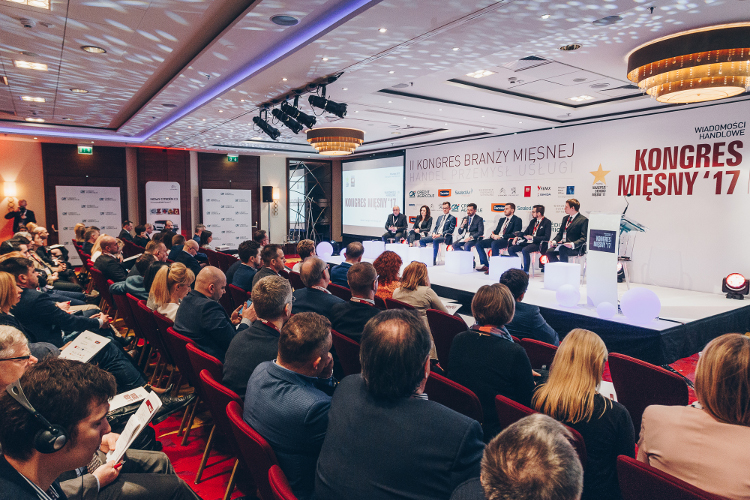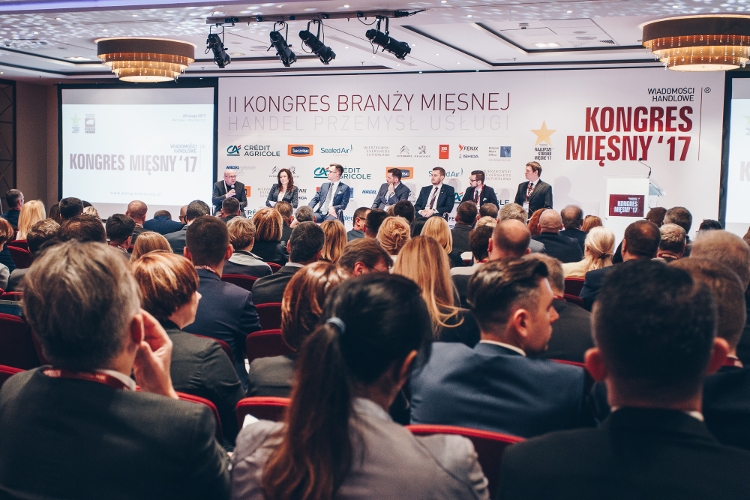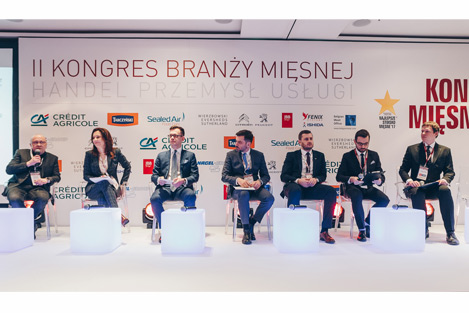
On 28 February, Mariott Hotel in Warsaw housed the second session of "Wiadomości Handlowe Meat Congress 2017" – the most important conference dedicated to the meat sector in Poland. Credit Agricole was the Platinum Partner of this event.
This year’s conference had over 300 visitors – producers, processors, distributors, and exporters of raw and cured meat as well as providers of services and solutions for the sector’s producers and retail chains. The debate focused on key topics relating to the meat market, such as prospects for the sector’s growth, investments and innovations, new technologies, export, product and price strategies, food safety and quality in the meat industry, and impact of international trade agreements on the meat market in Poland.
Speakers at the second session of the Meat Congress included experts from Credit Agricole. Jakub Borowski, the bank’s chief economist, gave a presentation titled "Changes in the structure of global meat consumption – trends and prospects". He pointed out that meat consumption in Poland in recent years showed low growth rate and should not be expected to accelerate in the coming years. Consequently, the inevitable solution for companies wishing to quickly increase sales is to expand to foreign markets. Especially noteworthy here are Asian and African markets which, according to FAO-OECD forecasts, will record both high pace of growth and high absolute increase of meat consumption in the next few years.
Jakub Olipra, economist, Agro market expert, took part in the debate "Meat Industry – time of new challenges". The panelists discussed i.a. about the status and the outlooks for the development of the meat sector. Commenting on the consolidation of the meat industry, J. Olipra pointed out that it was a slow process, as its substantial factor was accumulation of capital, which usually was the effect of many years of organic growth. However, J. Olipra emphasized that there were many factors promoting consolidation, among which the weak negotiating position of meat producers vis-à-vis retail chains was especially worthy of notice. Asked about investments in the sector, J. Olipra said that he expected them to continue to grow in 2017. However, he pointed out that increased uncertainty related to cases of avian flu and African swine fever recorded in Poland may be conducive to decline in investments.
Credit Agricole has joined the group of the partners of the event because the needs of the agricultural and agri-food sector are of particular significance to the Credit Agricole Group. The Group stems from agricultural cooperative banks. They have been in operation for over 120 years and today provide services to 90% of farmers in France. The mission of Credit Agricole is not only to support the development of large agri-food companies but also competitive advantage and sustainability of small and medium-size businesses which constitute the basis for regional rural economy. In addition to corporate finance, Credit Agricole is developing its expert knowledge of agricultural and agri-food business with a view to identifying key challenges and prospects for the respective sectors in the area of e.g.: competitiveness, production facilities, and commodity price volatility.
Also in Poland, the knowledge, experience, and commitment enabled Credit Agricole to become strong support for agribusiness at all its levels: from individual farmers to large corporations, from primary production to processing and major suppliers of auxiliary equipment and goods.
For several years now, Credit Agricole has been developing its offer for farmers, agri-food companies, and their suppliers.. The Bank is committed to the development of agriculture by providing financing in the form of investment loans, e.g. for the purchase of arable land, construction or modernization of farms, investment loans for the purchase of agricultural machinery and equipment, Agro credits in current account for any farming-related purpose, or revolving credits which support the financing of needs characterized by recurring cycles or seasonal nature. In addition, the bank offers complex financial solutions supporting ongoing agricultural activities in the form of AGRICOLE account. Farmers can also benefit from a wide range of bank products including personal accounts, payment cards, cash and mortgage loans, saving products, investment funds, and insurance.
Agri-food companies are offered the bank’s support in such areas as financing, transactional banking, trade finance, capital markets, investment banking and, thanks to the bank’s cooperation with other Credit Agricole Group companies in Poland, also factoring solutions and leasing enabling the financing of high-budget transactions.
A special offer of financing on preferential terms has been prepared by Credit Agricole for the customers and suppliers of agribusiness market leaders.
The organizer of the "Meat Congress 2017" is Wydawnictwo Gospodarcze Sp. z o.o. the publisher of i.a. "Wiadomości Handlowe" and the portal www.wiadomoscihandlowe.pl. More information about the conference is available on the site: www.kongresmiesny.pl and on the portal www.wiadomoscihandlowe.pl
